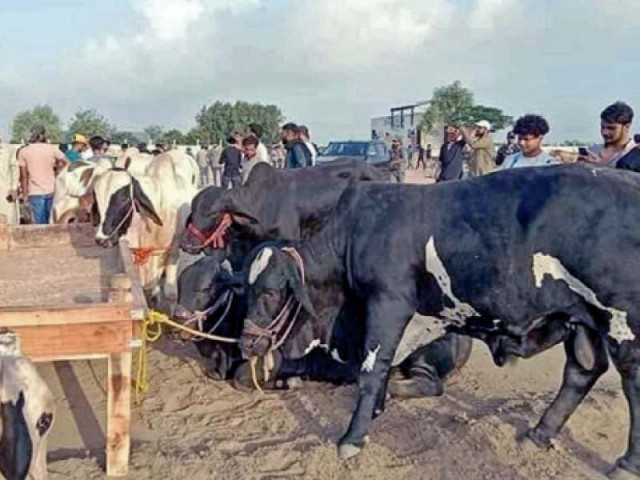People increasingly opting for group sacrifices
Soaring inflation, dwindling purchasing power, and financial hardships are some of the reasons

Due to recent catastrophic floods, economic instability, and increased transportation costs among other issues, the price of sacrificial animals has skyrocketed in the metropolitan city for this year's Eiul Azha.
The soaring inflation rate, dwindling purchasing power, and financial hardships have left many unable to fulfill their obligation of sacrifice (qurbani) during this annual religious festival.
Even individuals from the middle class who were able to afford individual sacrifices last year are now opting for collective sacrifices (ijtimahi qurbani) due to their precarious financial situations.
In response, administration of various madrassahs, mosques, and welfare organisations has introduced collective sacrifice packages at local and community levels. However, these packages have also witnessed a hike of Rs3,000 to Rs10,000 compared to the previous Eidul Azha, with most packages ranging from Rs15,000 to Rs25,000. Many people are now contributing to collective sacrifices costing less than Rs20,000.
Currently, traders are anxiously awaiting customers, while price-conscious buyers are searching for affordable sacrificial animals. Deals are being settled only after extensive bargaining, causing considerable worry for traders who are eager to sell their animals before Eid, allowing them to return home promptly.
Kashif Qureshi, a Karachi-based trader of sacrificial animals, attributes the surge in prices to the recent flood disasters, poor economic conditions, increased petroleum prices, rising transportation costs, expensive animal feed, besides other factors. Compared to last year, the prices of animals have increased by Rs30,000 to Rs50,000, with a tentative estimate indicating an overall increase of Rs20,000 to Rs200,000, depending on factors such as weight, breed, beauty, and associated expenses.
Qureshi notes a significant decline in purchasing trends due to the inflated prices, with people engaging in extensive negotiations while buying animals. Consequently, traders are facing considerable distress. The minimum price for a heifer with the lowest weight ranges between Rs100,000 to Rs150,000, while the starting price for a goat is Rs30,000 or higher. Each trader sets the animal's price based on the customer's negotiation skills.
Sheikh Zayed, supervisor of collective sacrifice at a local mosque, expressed concern over the substantial inflation rate and its impact on people's purchasing power. The middle class is finding it increasingly difficult to fulfill their religious obligation, which has led to a rise in collective sacrifices.
The price per share in collective sacrifices has also escalated from Rs3,000 to Rs10,000 due to the increased cost of animals. Most individuals opting for collective sacrifice are choosing packages ranging from Rs15,000 to Rs25,000.
Junaid, a volunteer from a welfare organisation offering collective sacrifices, mentioned that various packages are available at mosques, madrassahs, and local welfare institutions. These packages cater to individuals based on their financial capabilities. This year, there has been a significant shift towards collective sacrifices, primarily due to the adverse economic situation.
Tariq, a citizen working at a grocery store with a monthly salary exceeding Rs40,000, expressed his participation in an Rs18,000 collective sacrifice package. He emphasised the challenges faced by the middle class, given the high prices of sacrificial animals resulting from inflation.
Another citizen, Faheem, highlighted how many individuals who were able to participate in collective sacrifices last year are now unable to do so due to inflation. He called upon the government to devise strategies to reduce the price of sacrificial animals, enabling people to fulfill the Sunnah of Prophet Ibrahim (AS) more effectively.
Published in The Express Tribune, June 16th, 2023.



















COMMENTS
Comments are moderated and generally will be posted if they are on-topic and not abusive.
For more information, please see our Comments FAQ